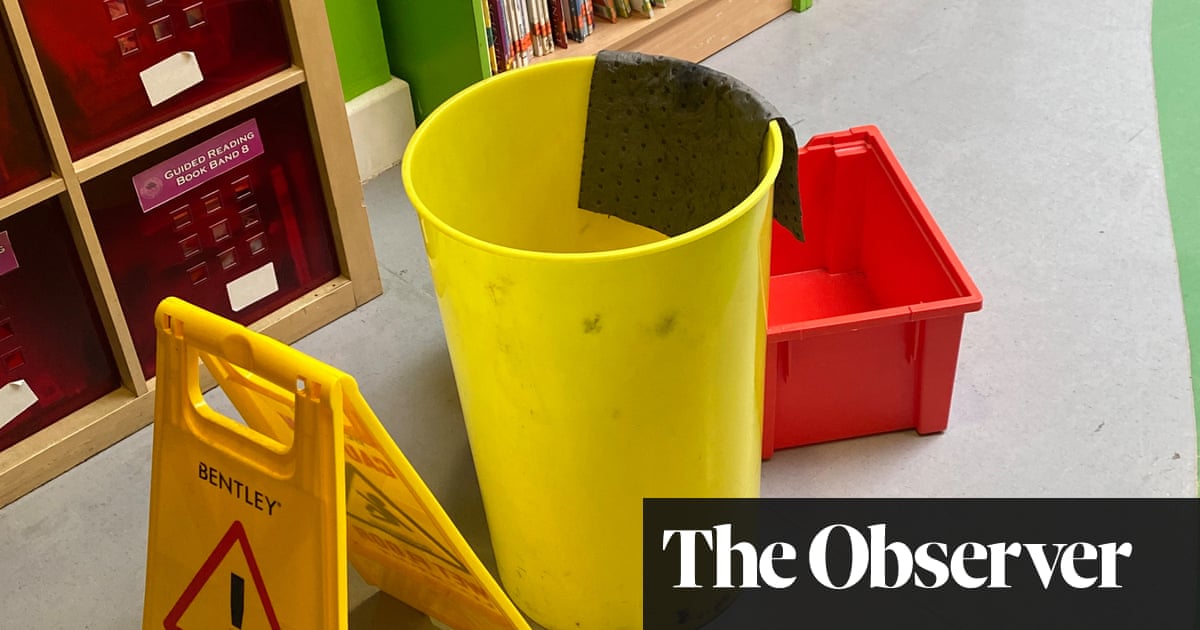
A record number of schools have had bids for building repairs turned down by the government, with experts warning that buckets on desks, freezing classrooms and power cuts are all becoming commonplace.
The Department for Education (DfE) announced on Tuesday that it had allocated £450m to 826 building repair projects at 733 schools through its annual condition improvement fund (CIF), which is designed to help academies and small academy trusts keep buildings “safe and in good working order”. But this is a fall of nearly 60% – in terms of total projects – compared with 2020-21, when the government awarded £563m to 2,104 repair projects.
The Observer has seen evidence of schools deemed by experts to be in urgent need, and whose bids were turned down last week, with collapsed ceilings, leaking roofs, derelict boilers and outdated electrical systems. Tim Warneford, a building consultant who helped write bids for many academies, said: “There are now many hundreds of schools whose staff and pupils will return after Easter to buildings that are unsafe, cold and damp.”
Some of his schools had children learning in mittens and coats but still failed to secure funding to fix the heating. “It’s now common to go into classrooms with buckets on desks and windowsills,” he said.
One London primary school he worked with lost its bid for cash to fix an elderly boiler that has been breaking down frequently. In its application, seen by the Observer and classified “highest priority need”, the academy trust CEO said: “Teachers have witnessed children unable to write because their hands are shaking [from cold].” The CEO said children were finding it hard to focus because they were cold.
Emails from teachers at the school, included in the bid, described classrooms that, even with electric heaters, didn’t get warmer than 11C or 12C all day. One wrote to the head: “Sitting in [this cold classroom] all day is not a nice experience, and the children are really noticing it. They take it in turns to stand in front of the heater.” Parents were advised to send their children to school in tracksuit bottoms, extra jumpers and coats.
The emergency electric heaters also frequently shorted the outdated electrical system, leaving classrooms without lights and power, as well as heating, until it could be fixed, the bid said.
Warneford said: “It’s ridiculous. How much more urgent do things need to be before the government will step in?”
A DfE spokesperson said: “It is the responsibility of those running our schools such as academy trusts, local authorities and voluntary-aided school bodies to ensure their schools are safe, well-maintained and compliant with relevant regulations.”
They added: “Schools and sixth form colleges will benefit from £1.8bn to help maintain their buildings, taking the total amount of funding to over £17bn since 2015.”
A small rural primary in the south-west had a bid to fix its badly leaking roof turned down, even though the ceiling had collapsed in the children’s cloakroom. The school was forced to cordon off a staircase because the ceiling above it was also at risk of possible collapse, Warneford said.
Young children now have to go outside and walk around the building to access the toilets. He said: “There was plaster on the carpet because the ceiling fell down, but it still wasn’t funded. The roof area is soaking wet, so other areas are vulnerable.”
Kit Andrew, headteacher of a primary academy in south London, was awarded £2m to replace the school’s failing boiler and electrics, which were both put in when the school was built in 1976, and now leave the school in frequent danger of having to close because there is no heating, hot water or power. However, with no money awarded to replace the badly leaking roof, he told the Observer that the new electrical work is likely to be damaged by the rainwater coming through the ceiling. “Water is running through the light fittings when we get bad rain,” he said. The school is currently relying on strategically placed buckets.
Andrew said the boiler is so old that they have been ringing retired engineers, trying to find someone who knows how to fix it, as well as sourcing defunct spare parts from scrap merchants. To increase his chances of winning the bid to replace it, Andrew put forward 10% of the total cost, which wiped out the school’s reserves. He said he is now “staring down a deficit budget”.
He added: “I’m losing a teacher in May and won’t replace her until September to save money. A much-needed teaching assistant retired this week, and I now can’t replace her at all.”












